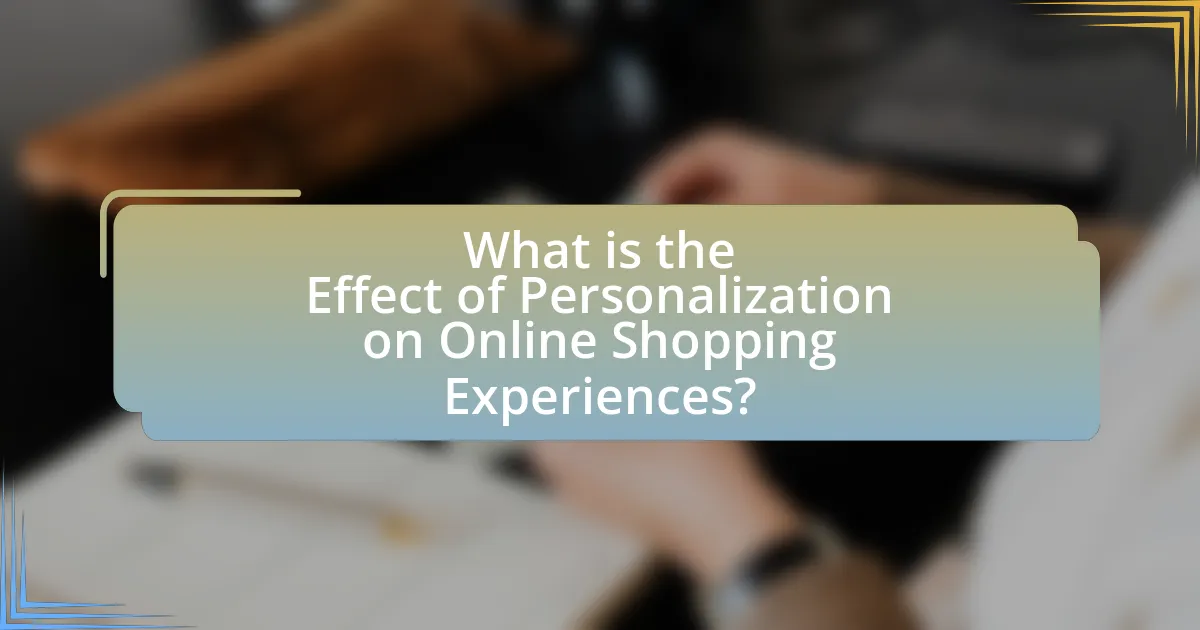The article examines the effect of personalization on online shopping experiences, highlighting its role in enhancing customer satisfaction, increasing conversion rates, and fostering loyalty. It discusses how personalized recommendations, targeted advertising, and advanced technologies like artificial intelligence and data analytics contribute to tailoring shopping experiences to individual preferences. Key findings indicate that personalization can lead to significant revenue increases for retailers, with studies showing that 80% of consumers are more likely to purchase from brands that offer personalized experiences. Additionally, the article addresses challenges such as data privacy concerns and the potential pitfalls of over-personalization, while offering best practices for businesses to effectively implement personalization strategies.

What is the Effect of Personalization on Online Shopping Experiences?
Personalization significantly enhances online shopping experiences by tailoring product recommendations and content to individual preferences. This customization leads to increased customer satisfaction, higher conversion rates, and improved customer loyalty. According to a study by McKinsey & Company, personalized experiences can lead to a 10-30% increase in revenue for retailers. Furthermore, research from Epsilon indicates that 80% of consumers are more likely to make a purchase when brands offer personalized experiences. These statistics demonstrate that effective personalization not only meets consumer expectations but also drives business success in the competitive online marketplace.
How does personalization influence consumer behavior in online shopping?
Personalization significantly influences consumer behavior in online shopping by enhancing user engagement and increasing conversion rates. When online retailers tailor product recommendations, marketing messages, and user experiences based on individual preferences and behaviors, consumers are more likely to make purchases. For instance, a study by McKinsey & Company found that personalized recommendations can lead to a 10-30% increase in sales. Additionally, personalization fosters customer loyalty, as consumers feel valued and understood, which can result in repeat purchases and higher lifetime value. This data underscores the effectiveness of personalization in shaping positive consumer behavior in the online shopping environment.
What psychological factors are affected by personalization in online shopping?
Personalization in online shopping significantly affects psychological factors such as consumer trust, perceived value, and decision-making processes. When consumers encounter personalized recommendations, they often feel a greater sense of trust towards the retailer, as tailored experiences suggest that the retailer understands their preferences and needs. Research indicates that 80% of consumers are more likely to make a purchase when brands offer personalized experiences, highlighting the importance of perceived value in driving sales. Additionally, personalization can streamline decision-making by reducing choice overload, as consumers are presented with options that align closely with their interests, leading to quicker and more satisfying purchasing decisions.
How does personalization impact customer satisfaction and loyalty?
Personalization significantly enhances customer satisfaction and loyalty by creating tailored experiences that meet individual preferences and needs. When customers receive personalized recommendations and communications, they feel valued and understood, which fosters a stronger emotional connection to the brand. Research indicates that 80% of consumers are more likely to make a purchase when brands offer personalized experiences, demonstrating a direct correlation between personalization and increased customer loyalty. Furthermore, a study by Epsilon found that 90% of consumers are more likely to engage with brands that provide personalized offers, reinforcing the idea that personalization is a key driver of customer satisfaction and long-term loyalty.
What are the different types of personalization in online shopping?
The different types of personalization in online shopping include product recommendations, personalized content, dynamic pricing, and targeted marketing. Product recommendations utilize algorithms to suggest items based on user behavior and preferences, enhancing the shopping experience by presenting relevant options. Personalized content involves tailoring website layouts, banners, and messaging to individual users, which can increase engagement and conversion rates. Dynamic pricing adjusts prices based on user data, market trends, and demand, allowing retailers to optimize sales. Targeted marketing employs data analytics to deliver customized advertisements and promotions to specific customer segments, improving the effectiveness of marketing efforts. These personalization strategies are supported by research indicating that personalized experiences can lead to higher customer satisfaction and increased sales.
How do recommendation systems work in personalizing shopping experiences?
Recommendation systems personalize shopping experiences by analyzing user data to suggest products that align with individual preferences and behaviors. These systems utilize algorithms that process historical purchase data, browsing history, and user ratings to identify patterns and predict future interests. For instance, collaborative filtering compares a user’s behavior with that of similar users to recommend items that others with similar tastes have liked. Additionally, content-based filtering recommends products based on the attributes of items a user has previously engaged with. Research shows that personalized recommendations can increase conversion rates by up to 300%, demonstrating their effectiveness in enhancing user engagement and satisfaction.
What role does targeted advertising play in personalization?
Targeted advertising plays a crucial role in personalization by delivering tailored content and product recommendations to individual consumers based on their preferences and behaviors. This approach enhances the shopping experience by increasing relevance, as studies show that personalized ads can lead to a 10 times higher click-through rate compared to non-targeted ads. Furthermore, targeted advertising utilizes data analytics to segment audiences, allowing marketers to create specific campaigns that resonate with distinct consumer groups, thereby improving engagement and conversion rates.
What technologies enable personalization in online shopping?
Artificial intelligence (AI), machine learning, and data analytics are key technologies that enable personalization in online shopping. AI algorithms analyze customer behavior, preferences, and purchase history to deliver tailored product recommendations. Machine learning enhances this process by continuously improving the accuracy of these recommendations based on new data. Data analytics provides insights into customer demographics and trends, allowing retailers to customize marketing strategies and user experiences effectively. For instance, a study by McKinsey & Company found that personalized recommendations can increase sales by 10% to 30%, demonstrating the significant impact of these technologies on enhancing online shopping experiences.
How do data analytics contribute to effective personalization?
Data analytics significantly enhance effective personalization by enabling businesses to analyze customer behavior and preferences. Through the collection and examination of data such as purchase history, browsing patterns, and demographic information, companies can tailor their offerings to meet individual customer needs. For instance, a study by McKinsey & Company found that personalized recommendations can lead to a 10-30% increase in sales, demonstrating the direct impact of data-driven insights on consumer engagement and conversion rates. By leveraging these analytics, businesses can create targeted marketing strategies, optimize product recommendations, and improve customer satisfaction, ultimately leading to a more personalized shopping experience.
What is the role of artificial intelligence in enhancing personalization?
Artificial intelligence plays a crucial role in enhancing personalization by analyzing vast amounts of consumer data to tailor experiences and recommendations. AI algorithms process user behavior, preferences, and demographics to create individualized shopping experiences, which can lead to increased customer satisfaction and loyalty. For instance, a study by McKinsey found that companies utilizing AI for personalization can achieve a 10-15% increase in sales. This data-driven approach allows businesses to predict customer needs and deliver relevant content, products, and services, ultimately improving the overall online shopping experience.
How does personalization affect sales and conversion rates?
Personalization significantly increases sales and conversion rates by tailoring the shopping experience to individual customer preferences. Research indicates that personalized marketing can lead to a 20% increase in sales, as consumers are more likely to engage with content that resonates with their specific interests. For instance, a study by McKinsey found that 71% of consumers expect companies to deliver personalized interactions, and 76% become frustrated when this does not happen. This alignment between consumer expectations and personalized offerings drives higher conversion rates, as customers are more inclined to complete purchases when they feel understood and valued.
What evidence supports the impact of personalization on sales performance?
Personalization significantly enhances sales performance, as evidenced by a study conducted by McKinsey & Company, which found that personalized experiences can lead to a 10-30% increase in sales. This increase is attributed to higher customer engagement and satisfaction, as personalized recommendations cater to individual preferences and needs. Additionally, a report from Epsilon indicates that 80% of consumers are more likely to make a purchase when brands offer personalized experiences, further supporting the positive correlation between personalization and sales outcomes.
How can businesses measure the effectiveness of personalization strategies?
Businesses can measure the effectiveness of personalization strategies through key performance indicators (KPIs) such as conversion rates, customer engagement metrics, and customer satisfaction scores. By analyzing conversion rates, businesses can determine how many personalized interactions lead to actual purchases, providing a direct correlation between personalization efforts and sales outcomes. Customer engagement metrics, including time spent on site and click-through rates, reveal how personalized content influences user behavior, indicating the relevance and appeal of the personalization strategy. Additionally, customer satisfaction scores, often gathered through surveys, can assess how well personalization meets customer expectations, offering qualitative insights into its effectiveness. These metrics collectively provide a comprehensive view of how personalization strategies impact online shopping experiences.
What challenges do businesses face when implementing personalization?
Businesses face several challenges when implementing personalization, including data privacy concerns, technological limitations, and the complexity of customer segmentation. Data privacy concerns arise as companies must navigate regulations like GDPR, which restrict how customer data can be collected and used. Technological limitations can hinder the ability to analyze large datasets effectively, making it difficult to deliver personalized experiences. Additionally, the complexity of customer segmentation requires businesses to accurately identify and target diverse customer preferences, which can be resource-intensive and challenging to manage. These factors collectively complicate the successful implementation of personalization strategies in online shopping experiences.
How do privacy concerns affect personalization efforts?
Privacy concerns significantly hinder personalization efforts by limiting the data that businesses can collect and utilize. When consumers are apprehensive about how their personal information is handled, they often opt out of data-sharing practices, which restricts companies’ ability to tailor experiences to individual preferences. For instance, a survey by Pew Research Center found that 79% of Americans are concerned about how their data is being used by companies, leading to a reluctance to engage with personalized marketing. This reluctance results in less effective targeting and diminished customer satisfaction, as businesses struggle to deliver relevant content without sufficient data.
What are the potential pitfalls of over-personalization?
Over-personalization can lead to several pitfalls, including privacy concerns, reduced user autonomy, and potential alienation of customers. Privacy concerns arise when excessive data collection for personalization makes users feel their information is being misused, leading to distrust. Reduced user autonomy occurs when recommendations become so tailored that they limit exposure to diverse options, potentially stifling exploration and discovery. Additionally, over-personalization can alienate customers who may feel that their preferences are being overly scrutinized, resulting in a negative shopping experience. Research indicates that 86% of consumers are concerned about data privacy, highlighting the importance of balancing personalization with user comfort.
What best practices should businesses follow for effective personalization?
Businesses should follow data-driven strategies, customer segmentation, and continuous testing for effective personalization. Utilizing data analytics allows businesses to understand customer preferences and behaviors, enabling tailored experiences. Customer segmentation helps in categorizing users based on demographics, purchase history, and browsing behavior, which enhances targeted marketing efforts. Continuous testing, such as A/B testing, ensures that personalization strategies are optimized based on real-time feedback and performance metrics. According to a study by Epsilon, 80% of consumers are more likely to make a purchase when brands offer personalized experiences, highlighting the effectiveness of these best practices.
How can businesses balance personalization with user privacy?
Businesses can balance personalization with user privacy by implementing transparent data practices and utilizing privacy-preserving technologies. Transparency involves clearly communicating to users how their data will be used, which builds trust and allows users to make informed choices about their information. For instance, a study by the Pew Research Center found that 79% of Americans are concerned about how their data is being used by companies, highlighting the importance of user awareness.
Additionally, businesses can adopt techniques such as differential privacy, which allows for data analysis without compromising individual user information. This method enables companies to provide personalized experiences while safeguarding user privacy. For example, Apple has integrated privacy features in its products that allow users to opt-out of tracking while still receiving tailored recommendations. By combining transparency with advanced privacy technologies, businesses can effectively balance the need for personalization with the imperative of user privacy.
What strategies can enhance the effectiveness of personalized marketing?
To enhance the effectiveness of personalized marketing, businesses should implement data-driven segmentation, utilize advanced analytics, and leverage customer feedback. Data-driven segmentation allows companies to categorize customers based on behavior, preferences, and demographics, leading to more targeted marketing efforts. Advanced analytics, including machine learning algorithms, can predict customer needs and personalize content accordingly, increasing engagement rates. Additionally, actively seeking and incorporating customer feedback ensures that marketing strategies align with consumer expectations, fostering loyalty and improving overall customer satisfaction. Research indicates that personalized marketing can lead to a 20% increase in sales, demonstrating its significant impact on business performance.





